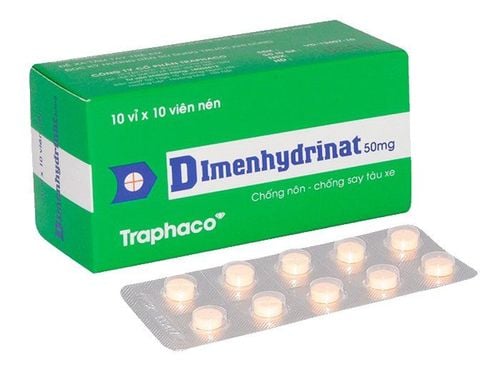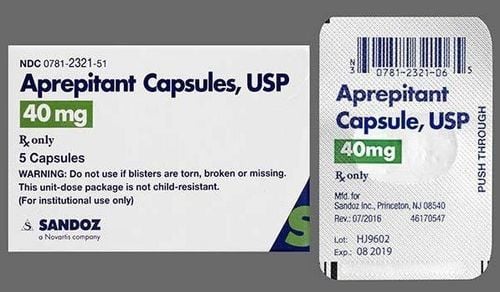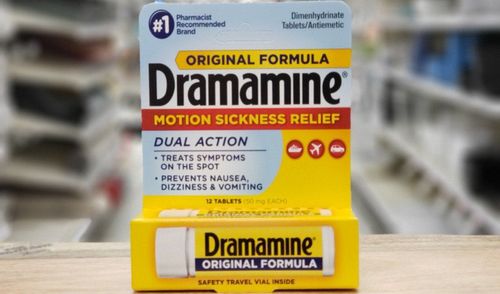This is an automatically translated article.
Vomina medicine containing the active ingredient dimenhydrinate is used in cases of nausea, vomiting after surgery or due to drugs, motion sickness. So how should Vomina be used?
1. What are the effects of Vomina?
Vomina drug, also known as dimenhydrinate, belongs to the antiemetic subgroup, prepared in the form of tablets with the strength of vomina 50mg and 100mg. Vomina has antiemetic effects in cases of nausea or vomiting after surgery, due to drugs and motion sickness.
Besides the above uses, Vomina medicine can also be used to treat some other conditions that are not listed above. Therefore, before taking the drug, consult your doctor for advice and effective use of the drug.
2. Usage and dosage of Vomina
Vomina medicine is made in the form of tablets, so it can be used on an empty stomach or on an empty stomach. You should take the medicine with a full glass of water to avoid stomach irritation. Dosage of Vomina will depend on the patient's condition and age such as:
For children aged 2-5 years old, the usual dose used to combat motion sickness is 12.5-25mg, for children to take orally. every 6-8 hours, drink about 30 minutes before going. The maximum dose is 75mg/day. For children from 6-11 years old: the usual dose is 25-50mg, every 6-8 hours, take the medicine about 30 minutes before going. The maximum dose is 150mg/day. For children 12 years of age and older, the usual dose is 50-100mg, the maximum dose is 400mg/day, taken 4-6 hours apart and taken 30 minutes before going. To use the drug safely, take Vomina exactly as directed by your doctor, do not use more, smaller or longer than prescribed. Absolutely do not abuse the drug for too long for a long time or arbitrarily increase the dose of the drug. Because this not only makes the condition worse, but also increases the risk of unwanted effects.
3. Undesirable effects when using Vomina
Some unwanted effects that may occur when using Yonsa medicine include:
Sedation causing sleep Dry mouth Palpitations Palpitation Thicker bronchial secretions Slower, then faster heart rate and arrhythmias Urinating blur Constipation Gastrointestinal disorders Abnormal central nervous system stimulation can occur in children and adults Before prescribing a drug, the doctor always considers the benefits and effects of Vomina medicine to outweigh the risks. have side effects. However, some cases when using Vomina may still occur unwanted effects. Therefore, when there are unusual signs after taking the drug, especially when a severe allergic reaction occurs with accompanying signs such as difficulty breathing, severe dizziness, swelling, rash or itching of the face, throat, tongue, ... the patient should immediately notify the medical staff for immediate intervention.
4. Some notes when using Vomina
Some notes when using Vomina medicine include:
Inform your doctor about a history of allergy to Vomina or any other allergies. Vomina may contain inactive ingredients and could cause an allergic reaction or other serious problems. Report any medications you are taking including prescription and nonprescription drugs, herbs and supplements, foods, dyes or preservatives. Vomina should be used with caution in cases such as angle-closure glaucoma, prostatic hyperplasia, urinary retention, epilepsy,... Vomina drugs may cause blurred vision, so after taking the drug, do not take the drug. Do activities that require alertness, such as driving or operating machinery. For pregnant and lactating women, there are not enough studies to determine the risks of taking vomina. Therefore, before using, consult your doctor to weigh the benefits and risks. If you forget to take a dose, take the missed dose as soon as possible. However, if it is almost time for the next dose, skip the missed dose and continue taking the medicine as scheduled. Do not arbitrarily use the drug twice the dose more than the treatment regimen. Using an overdose of Vomina can cause serious symptoms such as nausea, vomiting, abdominal pain, weakness,...
5. Vomina drug interactions
Drug interactions can reduce the effect of Vomina medicine, or increase the effect of unwanted effects. Tell your doctor about all other medicines you are taking including vitamins, over-the-counter medicines, prescription drugs, and herbal products. Do not stop, start, or change the dose of any medicine without your doctor's consent without your doctor's consent.
Some drugs that may interact with Vomina include:
Potassium acid phosphate Potassium chloride Potassium citrate Potassium phosphate Carbinoxamine Doxylamine Isocarboxazid Phenelzine Potassium iodide Pramlintide Procarbazine Rasagiline Selegiline Tranylcypromine In short, Vomina has an antiemetic effect in sad cases. vomiting or vomiting after surgery, due to drugs and anti-motion sickness. However, Vomina can cause some unwanted effects and drug interactions, so tell your doctor what medications you are taking to reduce the risk of side effects and increase effectiveness. for the treatment.
Please dial HOTLINE for more information or register for an appointment HERE. Download MyVinmec app to make appointments faster and to manage your bookings easily.













